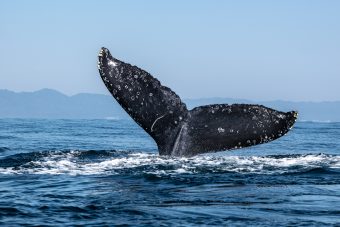
Until recently, the Arctic Ocean’s ice cover made it a natural “acoustic refuge” for marine animals for much of the year. Many marine animals, including narwhals, belugas, and bowhead whales, rely on clicks, whistles, songs and other noises to locate food, raise calves, and find mates for survival.
But melting sea ice has led to expanded shipping routes and increased oil and gas exploration in the Arctic. As a result of new shipping routes, the type and amount of noise underwater has significantly changed, and that traffic is expected to quadruple by 2025.
This activity puts whales and other species at tremendous risk and there is an urgent need to understand the impacts on these animals, upon which many coastal and Indigenous communities depend. Human-driven noise affects the animals’ ability to locate food, find mates, navigate, communicate, and evade predators, and can cause commercial fish species to abandon their habitats. And noise travels further underwater than above, further underscoring the threat to marine life.
Ship propellers, seismic booms, and construction are just some of the man-made noises that disrupt life under water—and their frequency is growing. A new report released by the Arctic Council—an intergovernmental and stakeholder forum for the Arctic—outlines the extent of disruption.
In just seven years, underwater noise has doubled in some areas of the Arctic. This is an incredibly rapid and concerning increase that puts wildlife in danger.
More:
Natural sounds—and the animals that rely upon them—are in danger of being overwhelmed by an increasingly loud and man-made racket.
These Arctic Council’s findings are a wakeup call to countries and the shipping industry to turn down the volume of industrial noise in the Arctic, it cannot be left unchecked.
But something can be done. Shipping operators can immediately make a positive impact by slowing down and directing travel routes away from key habitats, Indigenous-use areas, and protected areas. Slowing ships down by just 10 percent can reduce noise pollution by as much as 40 percent in some cases.
Arctic nations—including Canada, the Kingdom of Denmark, Finland, Iceland, Norway, the Russian Federation, Sweden and the United States— must acknowledge the global impacts of underwater noise and take action to keep noises at safe levels by pushing for quiet vessel designs, slower ship speeds, and changes in global regulated shipping routes.
These eight nations can stop the spread of underwater noise and gain a better understanding of its impacts on marine biodiversity and coastal and Indigenous communities, whose cultures and livelihoods depend upon a healthy marine environment.
Source: WWF
